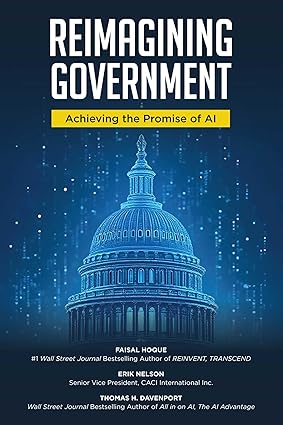Examines a complex and nuanced subject with confidence and know-how.
Reimagining Government: Achieving the Promise of AI by Faisal Hoque, Erik Nelson, and Thomas H. Davenport lays out a practical, research-driven vision for how artificial intelligence can reshape public service when guided by responsibility and foresight. Aimed at policymakers, technologists, and civic leaders, the book positions AI not as a shortcut or replacement for human judgment, but as a tool for governments to operate with greater speed, trust, and impact. Through case studies and real-world initiatives, the authors trace the technology’s evolution and highlight its use in citizen engagement, fraud prevention, disaster response, and generative applications such as drafting and simulation. What emerges is a clear warning that the most formidable obstacles are cultural and organizational rather than technical. To meet this challenge, the authors introduce two complementary frameworks: OPEN (Outline, Partner, Experiment, Navigate), designed to guide innovation and scaling, and CARE (Catastrophize, Assess, Regulate, Exit), created to address risk and establish safeguards. Alongside these models, the book advocates for portfolio-based investment strategies and durable human-AI partnerships that align innovation with ethics, as well as ideas for reskilling the workforce and a firm grounding in public service values.
Reimagining Government examines a complex and nuanced subject with confidence and know-how. The book offers clear, accessible explanations of technical AI concepts for non-specialist leaders so that they might better understand the rapidly expanding technology. This clarity is achieved through real-world government case studies that ground abstract principles in practice, as well as insights into leadership roles that can have an active influence on how technology is utilized and implemented. Though there is broad guidance on partnerships between agencies, the private sector, and civil society, this astute book has plenty of specific detail to help people from other backgrounds to see where they might “fit” into this new world of tech. The emphasis on organizational and cultural transformation, rather than just technological change, is highlighted in practical ways through OPEN and CARE, frameworks that balance innovation with reasonable safeguards. Serving as a warning for newcomers to avoid over-reliance and over-confidence, the guidebook presents a realistic evaluation of risks, including bias and model drift. What results is a well-argued call for new competencies, a push for thorough ethical grounding in democratic accountability, and a move toward public service values that are sorely needed in our current times. Both roadmap and rallying cry, Reimagining Government makes the case that the future of AI in the public sphere depends on cultural change as much as technological progress.







